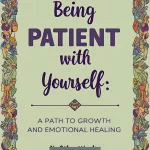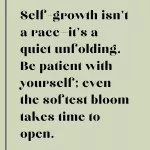In a world that demands speed, productivity, and perfection, learning to be patient with yourself may feel counterintuitive. But the truth is, self-patience is essential for sustainable growth and emotional healing. From navigating life transitions to managing personal struggles, practicing patience can serve as a stabilizing force in times of uncertainty. Many people find themselves overwhelmed by pressure to constantly succeed, especially in today’s fast-paced culture. This internal pressure often leads to burnout, low self-esteem, and emotional exhaustion.

We often extend grace and understanding to others, yet rarely offer ourselves the same kindness. Why is it so hard to say, “I’m doing my best, and that’s enough”? Society may tell us rest is laziness and that slowing down means falling behind. But real growth doesn’t always look like movement—it often looks like stillness, catching your breath, or gently rising after a fall. If you need more gentle reminders on your journey, you may find comfort in these collections of deep healing quotes and letting go quotes.
This article will explore:
- What it truly means to be patient with yourself
- How self-patience supports personal growth
- The psychological and emotional benefits of self-compassion
- Actionable strategies to foster patience in everyday life
- Insights to help you feel supported and understood
What Does It Mean to Be Patient With Yourself?

Patience with yourself isn’t just about waiting; it’s about how you treat yourself while you wait. It’s the art of giving yourself grace as you work through challenges or strive to meet your goals. Rather than demanding instant results, it involves embracing the idea that progress, not perfection, is the real measure of success.
The Psychology Behind Self-Patience
Self-patience is the permission to be a work-in-progress. It is the gentle voice inside that says, “This is hard, but I’m trying.” And that matters.
The Culture of Constant Pressure
Modern life often glamorizes overwork and equates value with productivity. Moreover, being patient with yourself is a radical act of self-respect in such an environment. It allows you to prioritize long-term wellness over short-term gains.
Our culture may not always reward slowness or rest, but healing and growth require both. When you embrace self-patience, you’re choosing to build a life that honors your health and humanity.
How to Break Generational Trauma and Create a Healthier Future
Why Patience With Yourself Fuels Growth

Personal Development
Self-patience helps you build resilience, a critical skill for personal development. When you allow yourself to fail without harsh judgment, you create space for reflection and learning. This mindset shift is crucial for building emotional strength.
Progress is often invisible at first. The roots of change grow quietly below the surface before you see the bloom. By allowing yourself to take time, make mistakes, and grow slowly, you develop confidence that doesn’t depend on performance, but on self-trust.
Life Transitions and Change
Whether you’re adjusting to a new season of life, recovering from emotional pain, or learning how to live more intentionally, patience gives you breathing room. It reminds you that there is no rush to figure everything out.
You may not always see immediate results. But patience allows your efforts to take root. Fulfillment and healing are not destinations—they’re journeys that unfold uniquely for each person.
The Emotional Healing Journey Begins With Patience

Healing—whether from trauma, burnout, or failure—does not follow a linear timeline. Practicing patience means acknowledging that:
- Setbacks are part of the process
- Emotional wounds take time to mend
- You are not defined by your worst days
There will be days when getting out of bed feels like an achievement. That’s okay. Give yourself credit for showing up, even if all you can manage is breathing through the moment. Healing often hides in these small, tender acts of self-compassion.
Practicing Mindfulness and Presence
Mindfulness means observing your thoughts and feelings without judgment. Plus, it fosters acceptance and helps you stay present, which is a key aspect of being patient with yourself.
The Science Behind It
When you slow down and become present, you reclaim power from fear, regret, and worry. You remind yourself that this moment—right now—is enough.
How to Be Patient With Yourself: Actionable Strategies

1. Reframe Negative Self-Talk
The way you speak to yourself matters. Inner dialogue shapes your reality, so when your thoughts are filled with harsh criticisms, your self-image suffers. Reframing negative self-talk begins with noticing those inner voices and choosing kinder, more constructive words.
- Instead of “I’m a failure,” try “I’m learning and growing.”
- Acknowledge the effort you’re making, even when results aren’t perfect.
- Speak to yourself as you would a dear friend—with encouragement, not judgment.
Being patient with yourself means allowing room for imperfection without letting it define your worth.
2. Set Realistic Goals
Ambition is admirable, but unrealistic expectations can lead to overwhelm and burnout. When you set goals that align with your current capacity, you create opportunities for consistent progress rather than discouragement.
- Break large goals into smaller, manageable tasks.
- Recognize and celebrate small wins along the way.
- Remember that timelines can shift—progress made slowly is still progress.
By meeting yourself where you are, you make space for growth without the pressure of having to prove anything to anyone.
3. Embrace Downtime
We live in a culture that often equates being busy with being valuable. But true productivity includes moments of rest. Downtime isn’t wasted time—it’s when your body and mind recover, recalibrate, and heal.
- Prioritize rest without guilt. Allow yourself to nap, take breaks, and enjoy leisure.
- Use downtime to reconnect with simple pleasures: nature walks, warm baths, music, or silence.
- Trust that rest is part of the work—it supports your ability to show up more fully in every area of life.
Self-patience involves knowing when to push and when to pause.
4. Practice Journaling
Journaling can be a powerful tool for emotional clarity and self-reflection. It allows you to process your experiences, express unspoken emotions, and track your growth over time.
- Try writing freely about your day, thoughts, or feelings without censoring yourself.
- Reflect on moments of struggle and moments of pride.
- Use journaling prompts like, “What would I say to a friend going through this?” or “What is one kind thing I can offer myself today?”
Moreover, journaling helps you see your own progress and patterns with greater compassion.
5. Seek Support
Self-patience does not mean walking the path alone. Sometimes being kind to yourself means reaching out for help. Plus, support can come in many forms: a friend who listens, a therapist who guides, or a community that understands.
- Talk to someone you trust about what you’re going through.
- Join a group where you can share and connect.
- Remember: needing help is not a weakness—it’s a human strength.
By allowing yourself to be supported, you honor your own healing journey with courage and grace.
How to Find Self Love in 10 Beautiful Steps
The Growing Acceptance of Mental Wellness

In recent years, the stigma around mental health has begun to dissolve. More people are embracing therapy, self-care, mindfulness, and emotional well-being as essential aspects of daily life.
These trends reinforce the message: being patient with yourself is not a weakness—it’s a strength. It means you value your inner world as much as your outer achievements.
Embracing your own healing and growth journey is a reflection of self-respect and inner strength.
Embrace the Process, Trust the Timing
Being patient with yourself is not about lowering your standards; it’s about honoring your pace. It acknowledges your humanity, accepts imperfection, and empowers you to grow intentionally. Whether you’re navigating life’s uncertainties, healing from emotional wounds, or simply trying to be kinder to yourself, patience is your ally.
Remember:
- Growth isn’t linear
- Healing takes time
- You are worth the wait
Start today by identifying one area of your life where you can extend more patience to yourself. Write it down. Reflect on it. Then take one small, deliberate step forward. Because your emotional healing journey begins with that first act of self-compassion.
Speak gently to yourself. You’re doing better than you think.
- Wisdom in Waiting: 15+ Patience Proverbs
- 20 Quotes About Emotional Scars To Help Your Healing Journey
- 20 Self Love Notes: Turn Your Life Around With Positivity
- 25 Quotes for Self-Improvement and Personal Growth










Leave a Reply